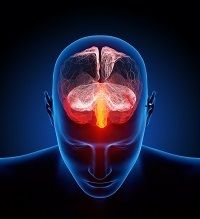Article
Vagal Nerve Stimulation Device Shows Promise in Treating Chronic Migraine
Author(s):
Treatment for patients with chronic migraine is notoriously elusive. Pharmacologic options are few and only two medications-topiramate and onabotulinumtoxin-have shown significant treatment effect in clinical research to date. As with most pain maladies, however, medication isn't the only treatment avenue.

Treatment for patients with chronic migraine is notoriously elusive. Pharmacologic options are few and only two medications—topiramate and onabotulinumtoxin—have shown significant treatment effect in clinical research to date. As with most pain maladies, however, medication isn’t the only treatment avenue.
A study in The Journal of Headache and Pain looked at vagal nerve stimulation (VNS) as a possible treatment for chronic migraine. The researchers studied a novel nerve-stimulating procedure, using a novel medical device called Nemos, which allows for non-invasive, transcutaneous stimulation of the auricular branch of the vagus nerve (auricular t-VNS) using a special ear electrode.
VNS has been shown to be effective for otherwise therapy-refractory epilepsy and depression. The Journal of Headache and Pain study was developed after a small sample of epilepsy patients comorbid with migraine experienced some preventive effect in migraine with VNS.
This was a small, monocentric, randomized, controlled, double-blind study of 46 randomized patients conducted in a German tertiary headache outpatient clinic in the department of neurology at University of Munich. Patients were excluded if they had fewer than 15 headache days per 28, or if they suffered from other primary or secondary headaches, severe neurologic or psychiatric disorders, fibromyalgia, or were unable to keep a headache diary, among other factors.
After one month of baseline, 46 chronic migraine patients were randomized to receive 25 Hz or 1 Hz stimulation of the sensory vagal area at the left ear by a handhold battery driven stimulator for 4 hours per day over 3 months. Six patients dropped out of the study; 4 due to adverse events. Researchers compared headache days per 28 days between baseline and the last month of treatment. They then used the Headache Impact Test (HIT—6) and the Migraine Disability Assessment (MIDAS) questionnaires to assess headache–related disability.
The results were better in the 1 Hz group than in the 25 Hz group, with almost 30% of patients in the former having a greater than 50% reduction in headache days, compared with 13.3% in the latter group. In both groups, HIT—6 and MIDAS scores were significantly improved. The most frequent treatment-related adverse events were local problems at the stimulation site, such as mild-to-moderate pain, paresthesia, or pruritus during or after stimulation, but no serious treatment-related adverse events occurred.
The study authors note, “…it is still not clear how vagus nerve stimulation interferes with migraine generation. One possibility is a direct or indirect inhibition of nociceptive trigeminal neurons by vagal activation…Alternatively, VNS might exert migraine prophylactic actions by modifying cortical excitability. Altered cortical excitability in chronic migraine has been demonstrated in various electrophysiological measurements is thought to contribute to its pathogenesis.”
The results are promising both because the primary endpoint (a 50% reduction of mean daily pain ratings) was reached, and because t-VNS therapy could potentially be combined with other medication treatments without cumulative adverse effects or drug interactions. The study authors caution that long-term effects and sustainability will need to be further tested in open-label trials.




